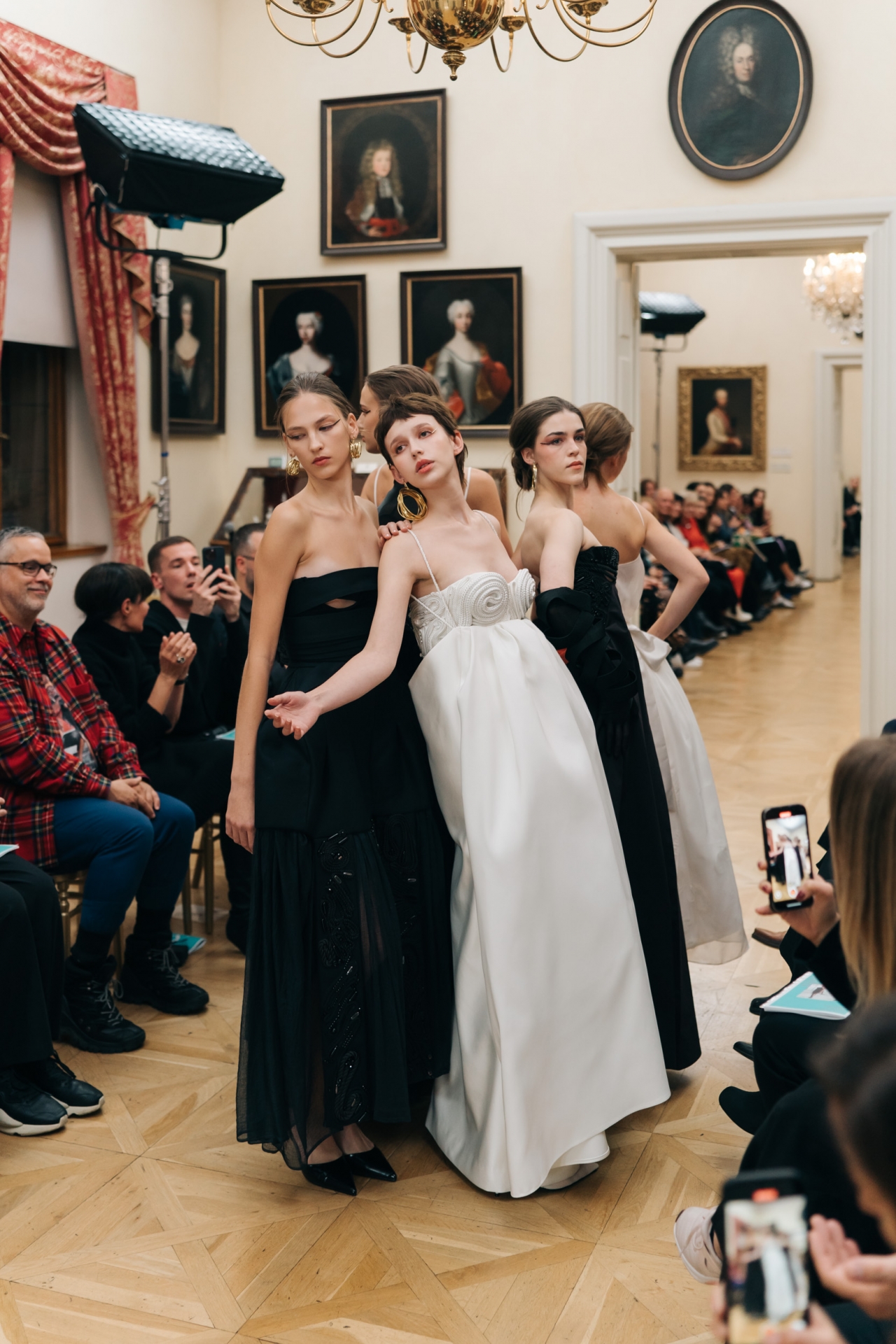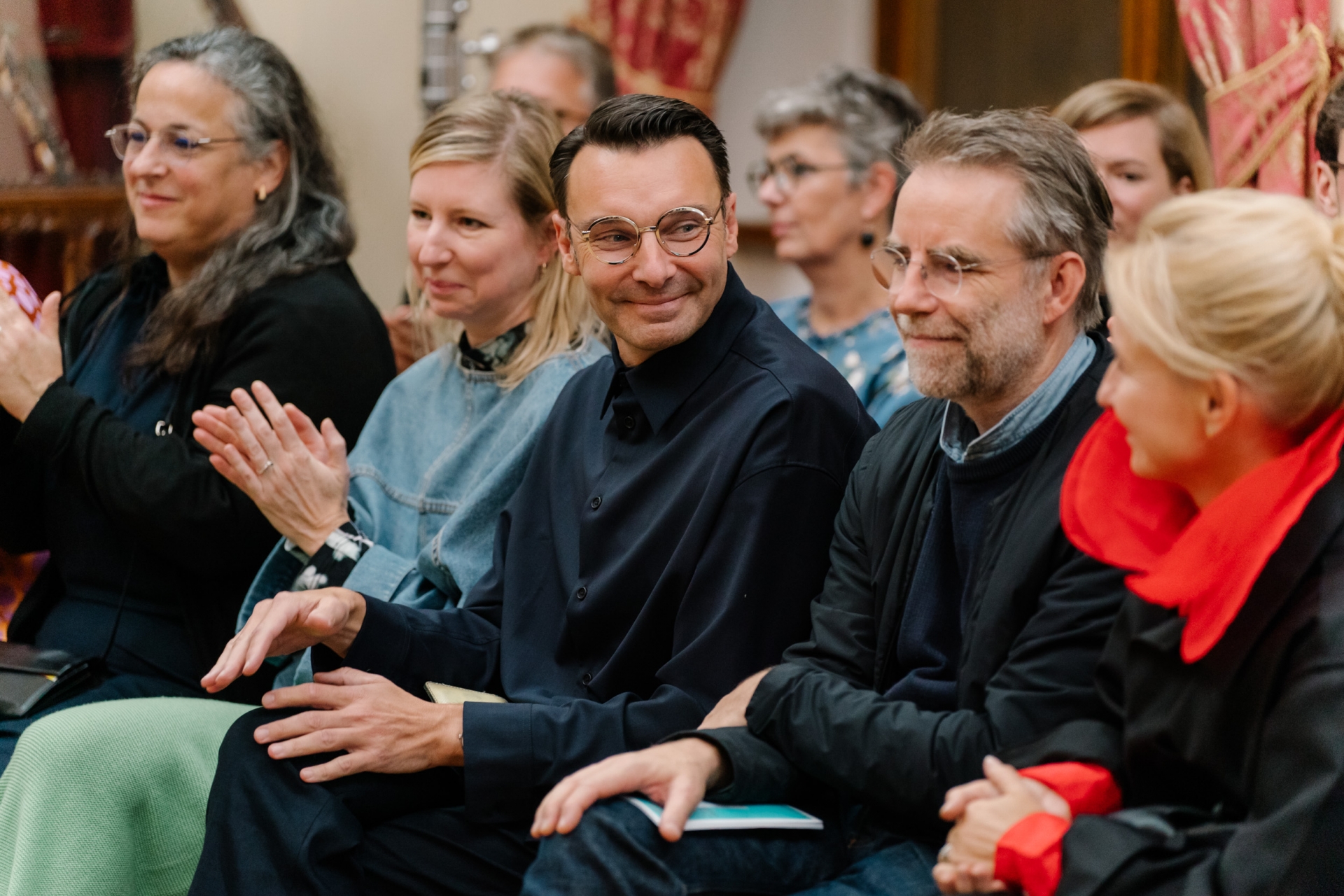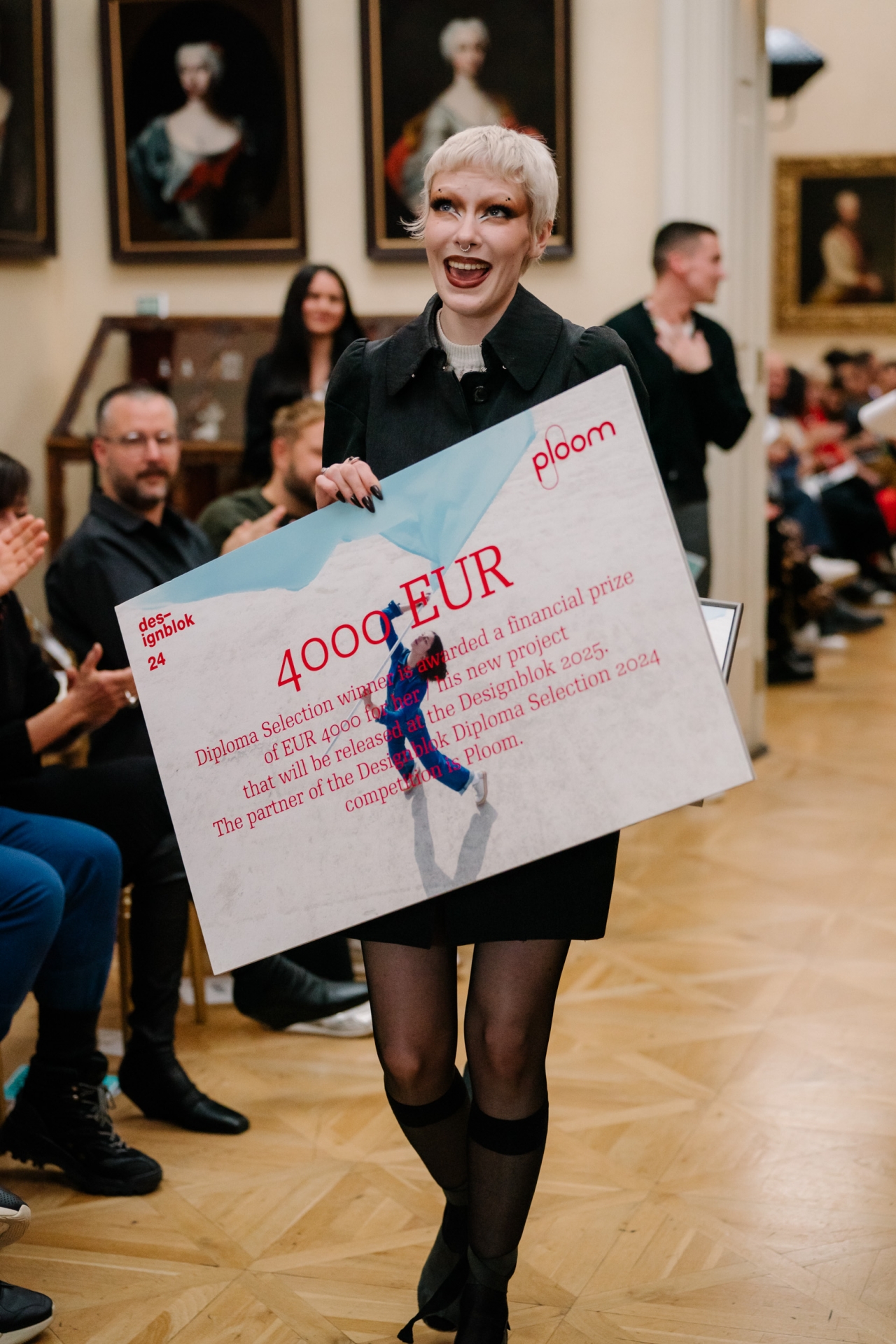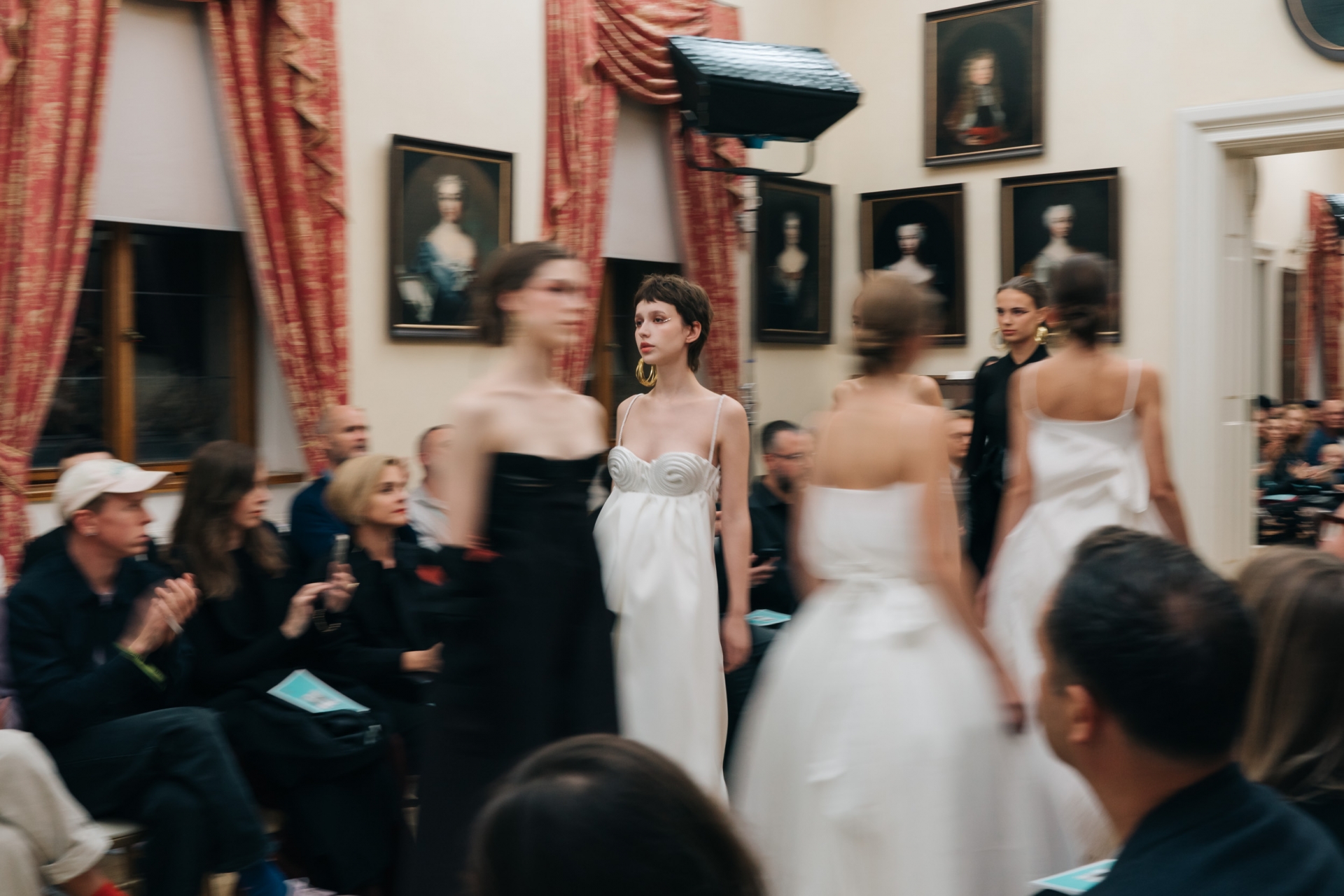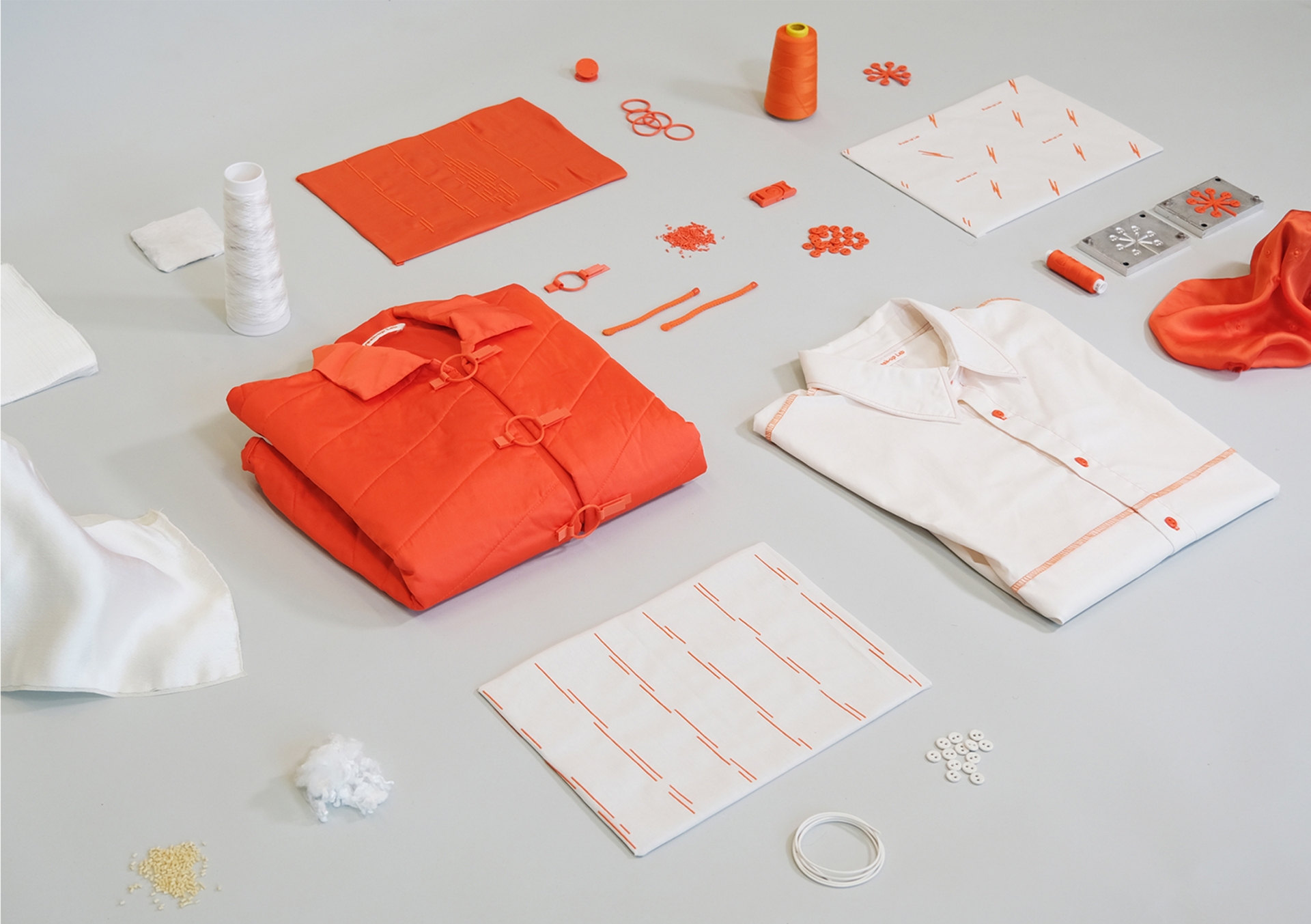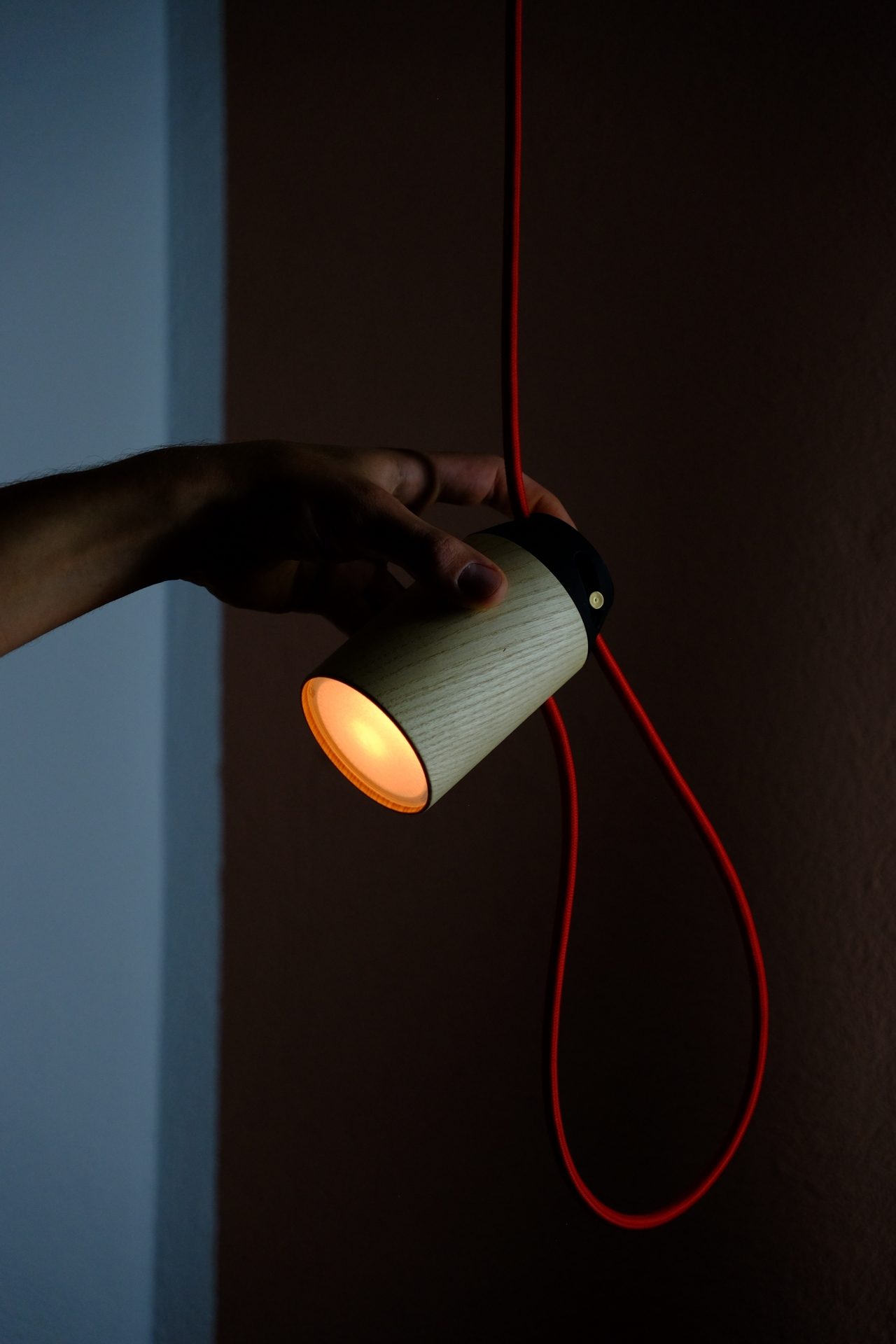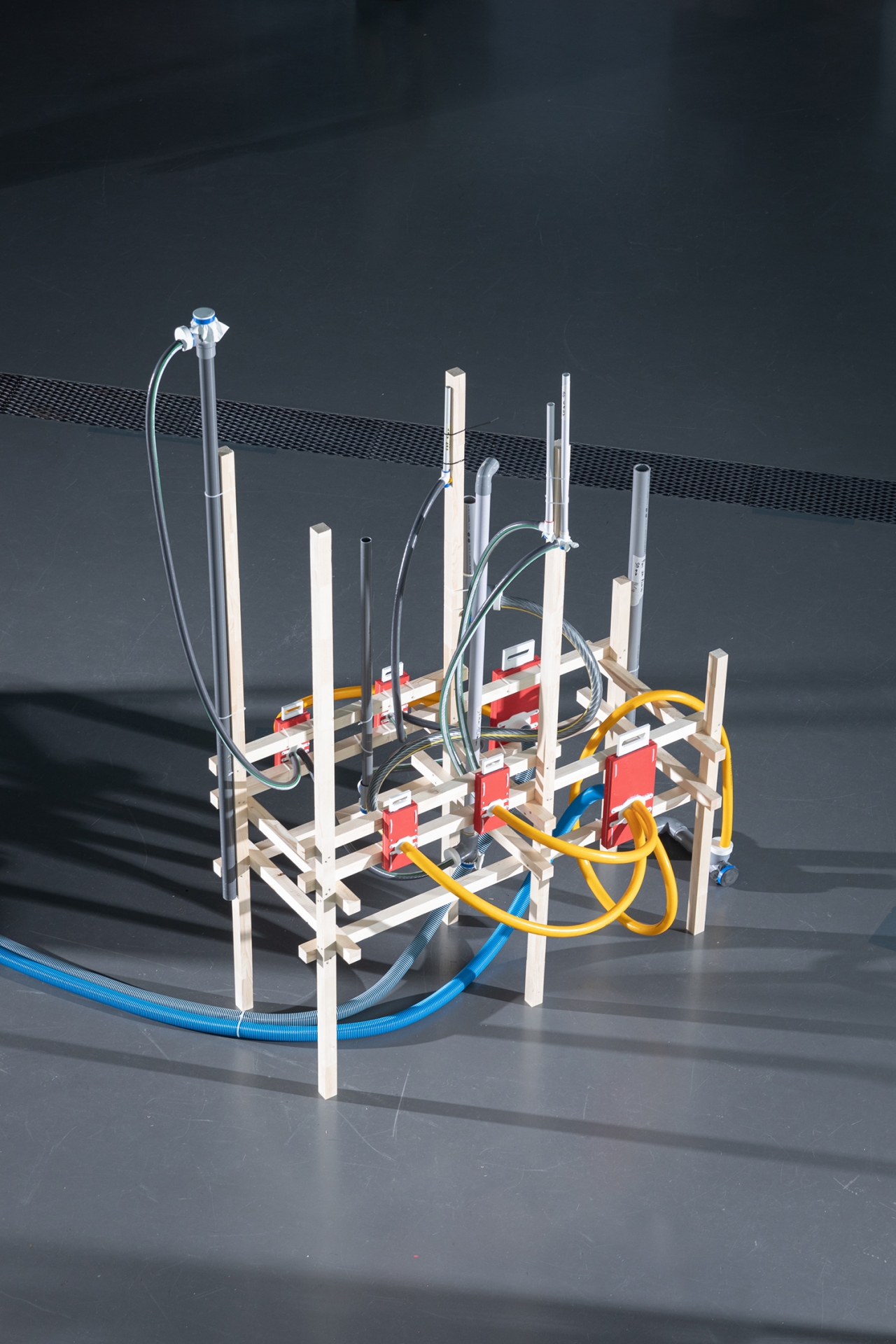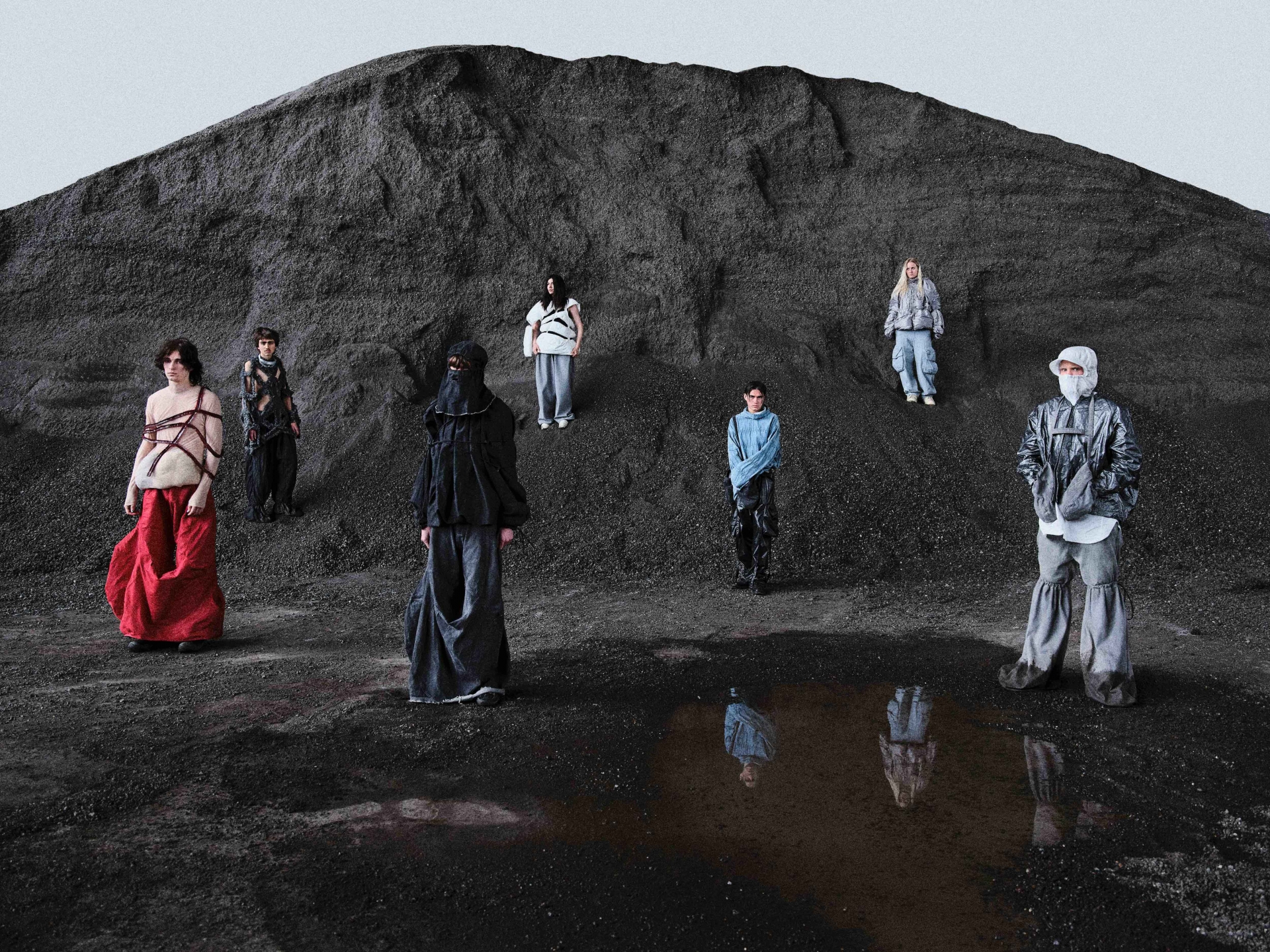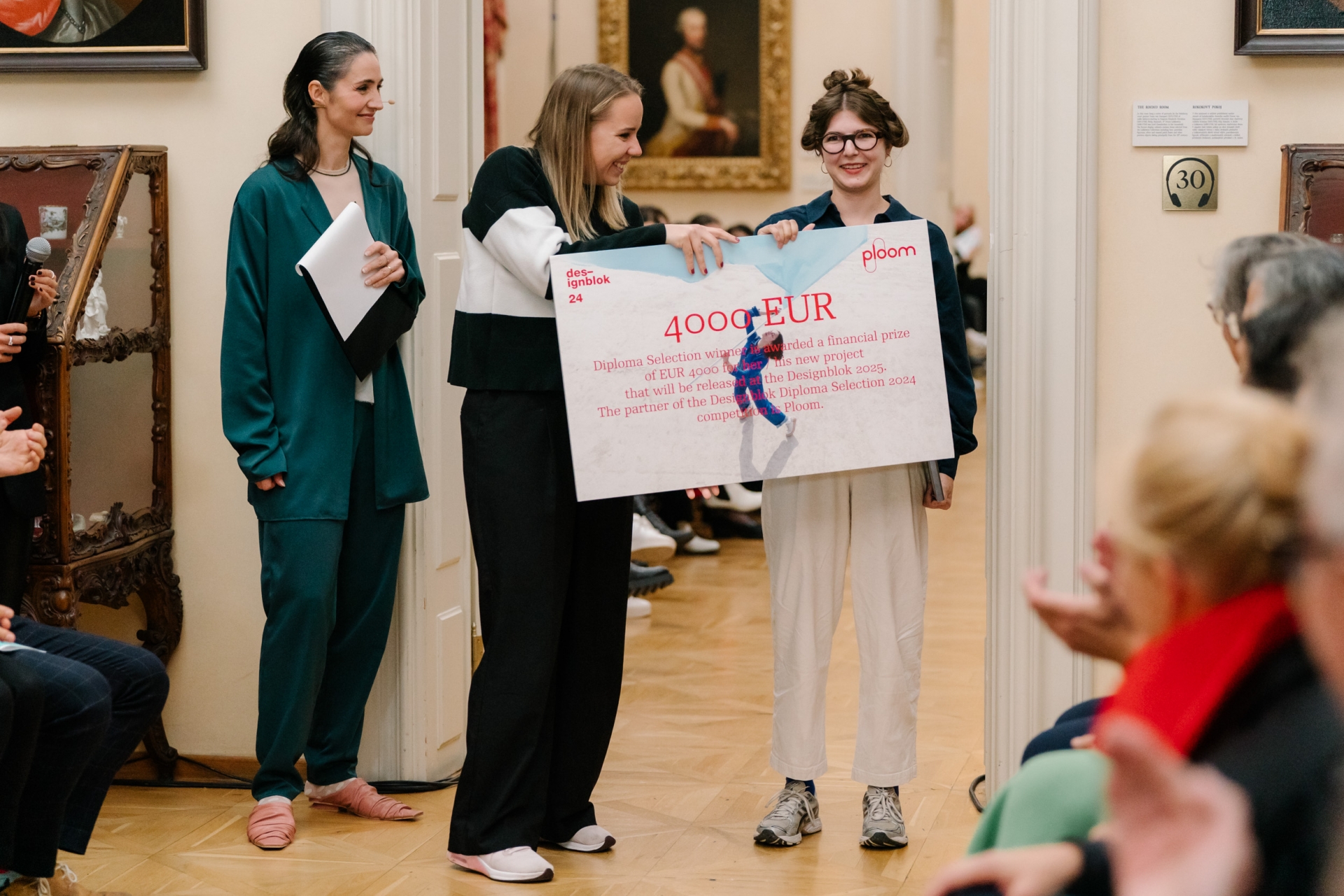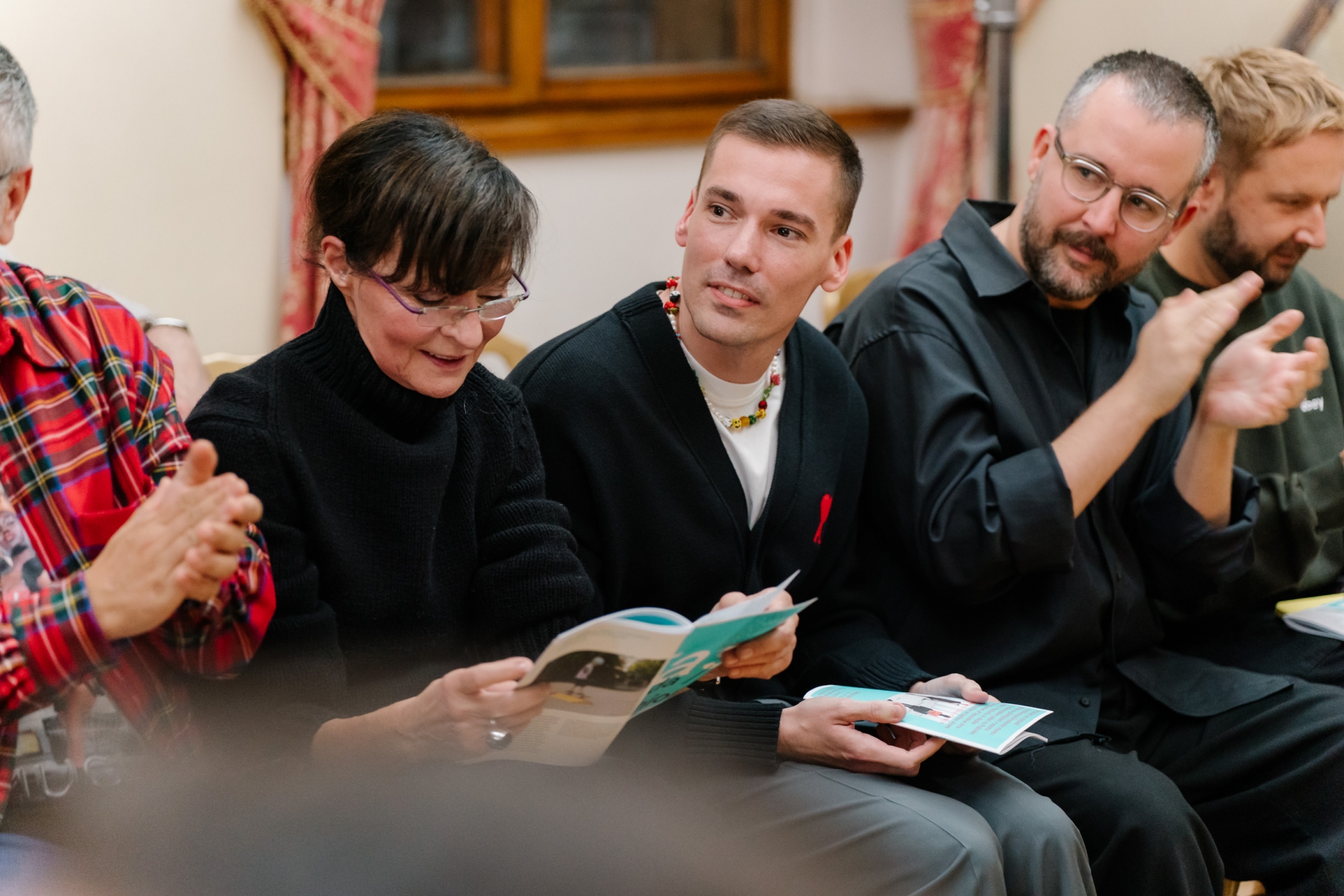An international expert jury awarded winners of the Diploma Selection competition
5. 10. 2024
Designblok has awarded some of the best European talent as part of the tenth Designblok Diploma Selection competition. The winners were selected by independent expert juries assembled by their respective presidents. First place in the product design category went to Sophia Reissenweber, a graduate of the German Burg Giebichenstein Kunsthochschule Halle, whose project Break-Up Lab uses biotechnological decomposition of polyester, allowing for its subsequent recycling. The best project in the fashion category was the diploma work of Nouka Rous, a Dutch graduate of the ArtEZ University of Arts in Arnhem. In her collection But by Reflection, Rous examines one’s self-image in the context of standing expectations about femininity. This year, 197 graduates from 63 European universities from 11 countries, including Czechia and Slovakia, sent in their applications, and the selected thirty best projects went on to the finals. The winners were announced on 5 October 2024 as part of a gala evening at the Lobkowicz Palace at Prague Castle. The winners in both categories received a financial reward of 4000 EUR from Ploom, the competition’s partner, as well as the opportunity to present as part of the next Designblok. The evening also featured fashion shows by designers Natálie Nepovímová and Barbora Rosa, who presented their new collections.
The aim of the competition, organized in collaboration with EUNIC Cluster Czech Republic, is to acclaim the works of the most talented European graduates in the field of product and fashion design. “Diploma Selection has celebrated its 10th anniversary. Originally founded by Designblok and EUNIC together with the Embassy of the Kingdom of the Netherlands, there was a clear goal from the start: to reach out to universities and academies across Europe, collect applications from their graduates and then showcase the top 30 finalists in the fashion and product design categories at Prague’s Designblok festival. We wanted to support young designers at the beginning of their careers, a time when their future is being decided. The key to the competition’s prestige was not only Designblok’s reputation and the fact that the competition is backed by the EUNIC Cluster – comprising embassies and cultural institutes from all over Europe – but above all that the competition juries are composed of eminent figures of European design scene. Designers get the opportunity to personally meet the people who can advise and help them move forward in their careers,” says Designblok director Jana Zielinski, adding, “We are thrilled that the competition has succeeded in achieving its goals. Our greatest thanks go to all the partners who have made the competition possible and who help the aspiring designers start their dream job, working in a field they love.”
This year, the roster of the international juries has changed. Presidents were appointed for both categories and were responsible for assembling the jury members and for overseeing the voting process. The jury President for the category of Product Design was Tulga Beyerle, director of the Museum für Kunst und Gewerbe Hamburg, who has been an important voice in the expert juries since the first days of the Designblok Diploma Selection competition. The jury further consisted of Evelien Bracke, curator of the Gent Design Museum; Jan Boelen, independent curator and art director of LUMA studio; Thomas Geisler, director of the Museum of Decorative Arts at the Dresden State Art Collections / DESIGN CAMPUS; and Alexandra Midal, independent curator, filmmaker and professor at HEAD-Genève. The jury of the Fashion category was assembled by journalist and independent brand strategist Jan Králíček. Further jury members were: professor and designer Liběna Rochová; fashion critic and journalist Sotiris Kaberis; designer and design director at Bottega Veneta Krzysztof J. Lukasik; and Alexandre Malgouyres, brand strategist and expert on communications in the fashion industry. All finalists also received presentation skills training with Anil Gezmen, creative strategist of the Dutch HTNK agency.
“The diversity of the presented projects proves the wide range of contexts in which design is able to make its mark – it seeks answers to more or less urgent questions of the contemporary world and society, and attempts to find complex and effective solutions,” said Tulga Beyerle at the awards ceremony. The product design jury awarded first place to Sophie Reissenweber’s project Break-Up Lab which addresses the end of one emotional relationship: that of the garment to its previous owner. The polyester present in used textiles can be decomposed by means of biotechnological processes and such components can then be transformed into biodegradable plastic. It is based on the recycling of one type of fiber into another. Sophie Reissenweber presents the aesthetic and functional potential of such clothing on two examples which present the outcome of circular recycling. Beyerle said the following about the winning project: “From the initial research and scientific analysis to the development of the concept, as well as its presentation and communication, Sophia did an outstanding job. Her work is exemplary and shows the potential of such a holistic approach to design. She very carefully considered the provenance of the materials used and the places they’ll travel, while keeping in mind the circular economy and always coming up with highly intelligent solutions.”
Second place went to Emile Demerliac, a graduate of the University of Applied Sciences and Arts in Geneva. This 29-year-old French designer and audiovisual artist connected his extensive experience of opera singing with the cultivation of design thinking. His project PIPES HAVE THEIR WAYS presents a sound machine which requires more people to function. It is an infrastructure of sound which consists of a tangle of hoses, interactive parts and PVC pipes. No previous knowledge of music is necessary to play it, and its activation is in itself a unique sound performance made to connect people. By merging the process of organ-building with DIY methods, this work pays homage to the history of technologies as much as to human collective intelligence which is able to freely improvise with them. Third place went to the LYFT lightings by Roman Freynhofer of the New Design University St. Pölten. The luminaire was designed for interiors and its minimalist aesthetic and ingenious clip fastened to a cable was inspired by elevator technology. This innovative solution furthermore draws electrical power through a single cable which simultaneously functions as a sliding mechanism to which the lamp is attached. An intuitive system also allows for quickly setting of the light’s warmth and intensity.
On the catwalk, the jury was most impressed by the show of Dutch designer Nouka Rous. A graduate of the ArtEZ university in Arnhem, her collection entitled But by Reflection examines the understanding of oneself in the context of standing expectations about femininity. It is about that moment when a person gradually starts being herself. Using waste fabrics, she created fragile sculptures which shed protective shells and transparent vulnerability as if shedding a cocoon. “Fashion is about stories. This particular collection impressed us with its ability to tell a story about itself, without the need for comment. Rous understands fashion as a feature of political and performative art. We appreciate her sustainable approach to gathering fabrics and their perfect forms which, despite the diversity of materials used, remain very coherent,” said Sotiris Kaberis about the reasoning behind the jury’s decision.
The second place went to Peter Wertmann, a graduate of the Royal Academy of Art in the Hague, whose diploma collection Lost Product of Society aimed to capture the essence of Arctic and Antarctic exploration, as well as the contrast between the vast, open landscapes and disciplined, confined living. The third place went to Aleš Hnátek, a graduate of the Academy of Arts, Architecture and Design in Prague, whose Wardrobe project explores the principles of the Italian Arte povera movement and the philosophy of wabi-sabi.
Winners of both categories received a financial reward of 4000 EUR from Ploom, the competition partner, and the laureates of the first, second and third places will get the opportunity to present their works at the next Designblok festival. The gala evening at the Lobkowicz Palace was moderated by Veronika Ruppert who is a creative producer at Czech Radio. The awards ceremony invited the general public, guests and the international juries, and also featured two fashion shows presenting the Forget-Me-Not collection of Designblok Diploma Selection winner Natálie Nepovímová as well as a new capsule collection by Barbora Rosa.
The 26th Designblok presented 236 designers, studios, companies and international guests. The grandest showcase of design and fashion in central Europe took place 2–6 October 2024 at Prague Castle, the Museum of Prague, Bastion Florenc, the Museum of Decorative Arts and other locations around Prague. The Art House exhibition at the Museum of Decorative Arts remains open until 20 October, and the exhibition Bóda Horák: Biosphere will remain open until 28 October 2024. Find out more at designblok.cz.
